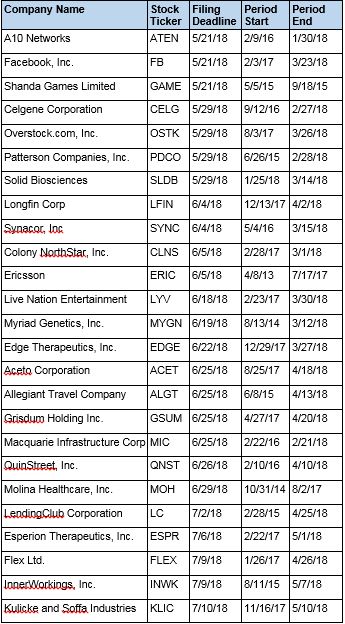ESPR Class Action Report
Levi & Korsinsky, LLP
May 14, 2018
On May 7, 2018, investors sued Esperion Therapeutics, Inc. (“Esperion” or the “Company”) in United States District Court, Eastern District of Michigan. Plaintiffs in the federal securities class action allege that they acquired Esperion stock at artificially inflated prices between February 22, 2017 and May 1, 2018 (the “Class Period”). They are now seeking compensation for financial losses incurred upon public revelation of the Company’s alleged misconduct during that time. Here’s everything you need to know about the Esperion class action lawsuit (ESPR class action lawsuit):
Summary of the Allegations
Company Background
The Company (NASDAQ: ESPR) is a biopharmaceutical company dedicated to researching and developing treatments for people with high LDL cholesterol. Specifically, it is focused on the discovery and development of “oral and small molecule therapies” to treat patients with this condition and associated “cardio metabolic risk factors.”
To that end, Esperion says its has “assembled an innovative team of lipid management experts who is exclusively committed to leveraging its scientific and clinical excellence and deep understanding of cholesterol biosynthesis.”
Bempedoic acid, to which the Company owns exclusive global rights, and its lead product candidate, the bempedoic acid/ezetimibe combination pill are “targeted therapies focused on reducing elevated LDL-C levels in patients with hypercholesterolemia.
Summary of Facts
Esperion and two of its senior officers and directors now stand accused of deceiving investors by lying and withholding critical information about the Company’s business practices and compliance policies during the Class Period.
Specifically, they are accused of omitting truthful information about the safety of bempedoic acid from SEC filings and related materials. By knowingly or recklessly doing so, they allegedly caused Esperion stock to trade at artificially inflated prices during the time in question.
The truth came out on May 2, 2018, when the Company announced the results of its “second pivotal Phase 3 study for its cholesterol-lowering medication.” The Company noted that the trial met “the primary endpoint of safety and tolerability and the key efficacy endpoint.” However Esperion also acknowledged that there were “13 deaths in treatment group compared to only two in the control group.”
A closer look…
As alleged in the May 7 complaint, the Company repeatedly made false and misleading public statements during the Class Period.
For instance, in a press release attached to a form filed with the SEC at the beginning of the Class Period, the Company said in relevant part: “We are encouraged by the early completion of patient enrollment in our long-term safety and tolerability study in January, and remain focused on completing patient enrollment across the remaining global pivotal Phase 3 studies.”
On another form filed with the SEC on August 8, 2017, the Company also said in pertinent part: “The Company intends to use positive results from the Phase bempedoic/ezetimibe combination and bempedoic acid programs to support global regulatory submissions for filing tandem LDL-C lowering indications in the U.S. by the first quarter of 2019 and Europe by the first half of 2019.”
Finally, on another form filed with the SEC on November 7, 2017, Esperion said in pertinent part: “The Company initiated the global pivotal Phase 3 clinical development program in January 2016, and expects to report top-line results for each of the four studies in the second and third quarters of 2018.”
Impact of the Alleged Fraud on Esperion’s Stock Price and Market Capitalization
| Closing stock price prior to disclosures:
|
$70.50 |
| Closing stock price the trading day after disclosures:
|
$45.75 |
| One day stock price decrease (percentage) as a result of disclosures:
|
35.10% |
The following chart illustrates the stock price during the class period:
Actions You May Take
If you have purchased shares during the Class Period, you may join the class action as a lead plaintiff, remain a passive class member, or opt out of this litigation and pursue individual claims that may not be available to the class as a whole.
NOTE: The deadline to file for lead plaintiff in this class action is July 6, 2018. You must file an application to be appointed lead plaintiff prior to this deadline in order to be considered by the Court. Typically, the plaintiff or plaintiffs with the largest losses are appointed lead plaintiff.
In order to identify your potential exposure to the alleged fraud during the time in question, you may wish to perform an analysis of your transactions in Esperion common stock using court approved loss calculation methods.
Recently Filed Cases
Listed below are recently filed securities class action cases being monitored by us, along with the class period and the deadline to file a motion to be appointed as the Lead Plaintiff in the action. Please contact us if you would like an LK report for any of these cases:
About Us
| This information is provided for general information purposes only, and should not be construed as legal advice, nor does it establish an attorney-client relationship with Levi & Korsinsky LLP. Any and all information herein is simply an opinion based on publicly available information and should not necessarily be construed as fact. For more information, please visit our website at www.zlk.com.
Attorney Advertising
|
Levi & Korsinsky is a leading securities litigation firm with a hard-earned reputation for protecting investors’ rights and recovering losses arising from fraud, mismanagement and corporate abuse. With thirty attorneys and offices in New York, Connecticut, California and Washington D.C., the firm is able to litigate cases in various jurisdictions in the U.S., England, and in other international jurisdictions.
Levi & Korsinsky provides portfolio monitoring services for high-net worth investors and institutional clients. Our firm also assists investors in evaluating whether to opt-out of large securities class actions to pursue individual claims.
For additional information about this case or our institutional services, please contact us.
